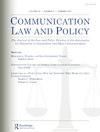性犯罪被害人隐私保护的评价方法——对各国被害人身份保护尝试的法律分析
IF 0.2
Q4 LAW
引用次数: 0
摘要
摘要未经性犯罪受害者同意而披露其身份会损害他们的自主权、尊严、平等和亲密关系。本文分析了美国各州法律如何保护性犯罪受害者的隐私利益。几个州已经允许在大众传播工具中印刷、出版或广播性犯罪受害者的身份信息。这些法律在适用于惩罚从公共记录中合法获得的具有公共意义的事项的真实披露时,与宪法权利相冲突。各州有时可能会惩罚故意或故意披露政府记录中存储的受害者身份信息的政府雇员。与各州用剑惩罚大众传播工具中的披露相比,当各州用假名或保密条款保护受害者身份时,引发的宪法问题更少。保护受害者隐私利益的方法可以承认受害者的隐私权,而不会过度限制受宪法保护的表达权。本文章由计算机程序翻译,如有差异,请以英文原文为准。
Evaluating Methods to Protect Sex Crime Victims’ Privacy: A Legal Analysis of States’ Attempts to Protect Victims’ Identities
Abstract Disclosing sex crime victims’ identities without their consent can harm their autonomy, dignity, equality, and intimacy. This article analyzed how state statutes in the United States may protect sex-crime victims’ privacy interests. Several states have allowed punishing printing, publishing, or broadcasting sex crime victims’ identifying information in instruments of mass communication. Such laws have conflicted with constitutional rights when applied to punish truthful disclosures of matters of public significance lawfully obtained from public records. States, at times, may punish government employees for knowingly or intentionally disclosing victims’ identifying information stored in government records. Fewer constitutional concerns arise when states shield victims’ identities with pseudonyms or confidentiality provisions than when states use swords to punish disclosures in instruments of mass communication. Methods to shield victims’ privacy interests may recognize victims’ privacy rights without unduly limiting constitutionally protected expression rights.
求助全文
通过发布文献求助,成功后即可免费获取论文全文。
去求助
来源期刊
CiteScore
0.60
自引率
33.30%
发文量
7
期刊介绍:
The societal, cultural, economic and political dimensions of communication, including the freedoms of speech and press, are undergoing dramatic global changes. The convergence of the mass media, telecommunications, and computers has raised important questions reflected in analyses of modern communication law, policy, and regulation. Serving as a forum for discussions of these continuing and emerging questions, Communication Law and Policy considers traditional and contemporary problems of freedom of expression and dissemination, including theoretical, conceptual and methodological issues inherent in the special conditions presented by new media and information technologies.

 求助内容:
求助内容: 应助结果提醒方式:
应助结果提醒方式:


